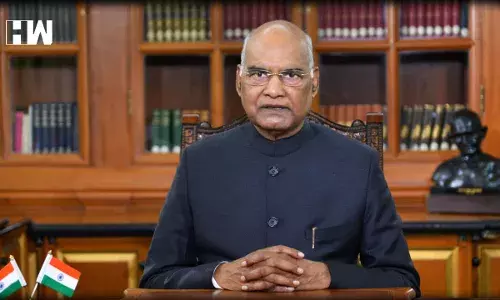New Delhi: President Ramnath Kovind has stated that work from home has a set of benefits, but still it has put working women under triple pressure. In a letter to young Indians published in the Manorama Yearbook 2022, he has said that women already have the double burden of paid work and “unpaid work”, that is, domestic responsibilities.
“On top of that, as children attend school from home, their learning has to be supplemented by the parents, and that task usually falls on the mother,” President Kovind writes in the letter, titled “Arise, The Future Beckons”.
“The new stress on family time should be welcome for male employees, so that they can share some of the responsibilities of their partners. In any case, studies show that hard work in itself can be even counterproductive and as the number of hours spent on work goes up, productivity comes down in some instances,” he writes.
Kovind has also said that this covid pandemic has taught us exactly those lessons that will come handy for climate action.
This pandemic has been a crisis situation, but it might be just a warning of a far bigger crisis that is looming over the horizon.
“Climate change is no longer a matter of scientific research and policy discussions; its impact is already tangible, and we are fast running out of time to keep global warming within feasible limits,” he writes.
The decade of the 2020s, he says, could turn out to be the most decisive point. “The situation is dire and pessimism won’t be out of place, but I remain hopeful.”
Amid career opportunities he says, under social imperatives or under peer pressure, many often equate a ‘career’ with a ‘job.’ He said, “As average Indians in your twenties, the question of career is bound to be uppermost in your minds. Under social imperatives or under peer pressure, many of you often equate a ‘career’ with a ‘job’, preferably with the assurance of its continuity till superannuation. That is understandable. India’s bureaucracy and public sector both require talented, hardworking youngsters.”
But here terming jobs, he is not referring only to one public sector, “Our private sector has contributed immensely to the creation of wealth for all, and it would also need talent to take India’s economy to new heights,” he said.
He stresses that a career need not mean a job.
“In the new century, many of our deeply held notions of ‘work’ were anyway undergoing changes, and COVID-19 only hastened that process. It forced movement restrictions and lockdowns on us, paralysing economies around the world. As a result, there were job losses and salary cuts, but there was also a rise in the ‘gig economy’,” he says.
He then goes on to say that in this “brave new world, a brave new breed of youngsters is seeking neither jobs nor the financial security of the routine nine-to-five work but a rightful recognition of and remuneration for their unique talents, for their creative vision, for their skills”.
“Instead of safety, their preference is for flexibility. Instead of closing their options, they are exploring more alternatives,” he writes.
Along with the gig economy, another trend in recent years, according to President Kovind, is work-life balance — a phase when hard work alone was of paramount importance is over in many nations, organisations and sectors.
As an independent media platform, we do not take advertisements from governments and corporate houses. It is you, our readers, who have supported us on our journey to do honest and unbiased journalism. Please contribute, so that we can continue to do the same in future.

